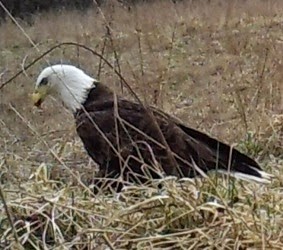 | |
| Golden eagle- REK |
After a recent trapping of 11 feral hogs by hog trapping friends working with USDA and MDC, we had scattered gut piles in a narrow hayfield in the middle of the forest. I put a game camera on it to see what would come in, hoping to get a picture of a coyote or bobcat. What I got were eagles!
 |
| Turkey vulture warming up |
Initially there were 12 turkey vultures that alternated shifts with 20 plus crows throughout the day. In the early morning hours the vultures frequently had their wings spread out like they do on our barn to warm up. I could not find any reference to mantling behavior to protect their finds and suspect that they were just cold.
 |
| Immature golden eagle |
Then at 7:19 PM I "struck gold." In spite of the setting sun and the 38 degree temperature, an immature golden eagle arrived and looked things over for several minutes. The following morning it returned at 7:53 AM and hung around for 12 minutes, possibly discouraged by the 13 degree temperature.
 There was more excitement to come. At 2:29 PM a bald eagle arrived, scattering many of the crows. It only stayed around for 3 minutes, possibly turned off by the lack of anything but stinking guts. This served to remind me that Benjamin Franklin opposed the selection of the bald eagle for the official seal as he considered it cowardly. He favored the turkey. The golden eagle might have been a better selection but bald eagles were
more more commonly seen by the early settlers and were considered the American eagle.
There was more excitement to come. At 2:29 PM a bald eagle arrived, scattering many of the crows. It only stayed around for 3 minutes, possibly turned off by the lack of anything but stinking guts. This served to remind me that Benjamin Franklin opposed the selection of the bald eagle for the official seal as he considered it cowardly. He favored the turkey. The golden eagle might have been a better selection but bald eagles were
more more commonly seen by the early settlers and were considered the American eagle."(The turkey) is besides, though a little vain and silly, a Bird of Courage, and would not hesitate to attack a Grenadier of the British Guards who should presume to invade his Farm Yard with a red Coat on.” (I have personally attested to the valor of a turkey in the attack mode in Turkeys Gone Wild.)
The next afternoon a hawk arrived to join the vultures, but by then little was left but the intestinal contents and it quickly left. It was interesting that its arrival didn't intimidate the crows. I suspect that by this time even they had no interest in defending piles of intestinal content.
 |
| Hawk among the crows. |
Now I am not a "birder" although I play one on the blog occasionally, so I first thought this was an immature bald eagle. I referred this picture to Jeff Cantrell and a number of very patient GOAS* friends with expertise and they universally pounced on this as an immature golden eagle.
How big a deal is it to see a golden eagle along Bull Creek? Their usual territory is west of Missouri, from Mexico through California up into Canada. Furthermore, a small grassland in the middle of a forested region isn't their usual territory. Allaboutbirds.com says "Golden Eagles live in open and semi-open country featuring native
vegetation across most of the Northern Hemisphere. They avoid developed
areas and uninterrupted stretches of forest." As Jeff Cantrell wrote me, "That golden eagle is quite a find, for if it was Barton or Vernon County up it would be considered a great find and “uncommon,” and farther east and in more wooded hills it is really rare."
Based on my "years of golden eagle experience," if you want to see one, let me recommend hog guts. Good for eagles and good for the land. Organized hog hunting is discouraged, but if you see a feral hog, shoot it. No permit is needed except for a valid permit when out hunting in deer and turkey season. More importantly report any sightings immediately to the contacts listed below. If you shoot a hog you may kill one but the rest scatter. Trapping is much more effective than hunting and you might end up with some great pork.
